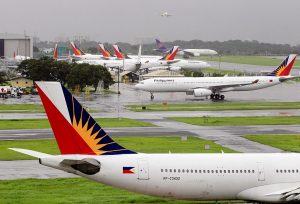PAL expands fleet with purchase of 9 Airbus aircraft

FLAG CARRIER Philippine Airlines (PAL) on Tuesday said it had closed a deal with European manufacturer Airbus S.E. for the acquisition of nine A350-1000 long-range aircraft.
The new planes will be utilized for nonstop flights from Manila to various destinations in North America, including the East Coast of the US and Canada, the airline said in an e-mailed statement.
PAL already operates two A350-900 aircraft, and the addition of these nine planes will further strengthen its fleet, the flag carrier noted.
Each A350-1000 aircraft has a listed price of $366.5 million, resulting in a total acquisition value of approximately $3.3 billion, based on Airbus’s 2018 price list.
“This order will see PAL operating one of the youngest and most modern widebody fleets in Asia,” said Stanley K. Ng, president and chief operating officer of PAL.
“We selected the A350-1000 to give PAL the power to match capacity closely to predicted demand on both the very longest routes to the North American East Coast but also on our prime trunk routes to the West Coast and potentially to Europe as well,” he added.
The new aircraft will use less fuel than older aircraft of a similar size which will help in the airline’s aim of reducing its carbon emission.
Meanwhile, Airbus Chief Commercial Officer and Head of International Christian Scherer said that the sale is a strong endorsement of the aircraft type.
“This order is another strong endorsement of the A350 as the world’s long-range leader. In terms of non-stop flying capability, efficiency and passenger comfort, it is proven to be best in class,” Mr. Scherer said.
“It also brings significant reduction in emissions and an immediate contribution to industry sustainability goals. And in the larger widebody category, the A350-1000 has set a standard of its own, with the lowest operating costs and emissions for intercontinental service,” he added.
Airbus is the leading supplier of the country’s airlines, with its aircraft flying with AirAsia Philippines, Cebu Pacific, PAL, and PAL Express. These aircraft include the A320neos, A330neos and the long-ranged A350s.
PAL is currently running 69 aircraft, which used to be 98 prior to the pandemic. The nine brand new orders will bring the fleet count to close to 80, said PAL Spokesperson Cielo C. Villaluna in a Viber message.
“That will address the current need for more planes and widen our flight route network,” Ms. Villaluna added.
SPARE PARTSIn an interview with Radyo Singko on Monday, Ms. Villaluna said that the new planes are an answer to the shortage of airplane spare parts globally which has led to flight delays and cancellations and passenger inconvenience.
“As a result of the supply chain issue we have several planes that are grounded. That is the challenge that we are facing right now,” she said.
Aside from the acquiring new planes which are expected to be operational by a year and a half, Ms. Villaluna said that the airline is also looking at the restoration of parked aircraft.
“These are the aircraft that were parked over the last two to three years because of the pandemic when PAL had lower revenues and we had financial challenges. These are on lease arrangement so it was costly to maintain so they were parked for a while and now we are planning to restore them back to service,” she added.
Ms. Villaluna also said that the supply chain is improving and that it’s only that it comes in tranches.
Last week, the airline issued a statement to apologize to its customers for several flight cancellations.
On an average, unplanned cancellations over the past two weeks were 10 flights in combination of international and domestic travel, said Ms. Villaluna. — Justine Irish D. Tabile




